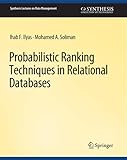Probabilistic Ranking Techniques in Relational Databases [electronic resource] / by Ihab Ilyas, Mohamed Soliman.
By: Ilyas, Ihab [author.] .
.
Contributor(s): Soliman, Mohamed [author.] | SpringerLink (Online service)
| SpringerLink (Online service) .
.
Material type:  BookSeries: Synthesis Lectures on Data Management: Publisher: Cham : Springer International Publishing : Imprint: Springer, 2011Edition: 1st ed. 2011.Description: VIII, 71 p. online resource.Content type: text Media type: computer Carrier type: online resourceISBN: 9783031018466.Subject(s): Computer networks
BookSeries: Synthesis Lectures on Data Management: Publisher: Cham : Springer International Publishing : Imprint: Springer, 2011Edition: 1st ed. 2011.Description: VIII, 71 p. online resource.Content type: text Media type: computer Carrier type: online resourceISBN: 9783031018466.Subject(s): Computer networks Introduction -- Uncertainty Models -- Query Semantics -- Methodologies -- Uncertain Rank Join -- Conclusion.
Ranking queries are widely used in data exploration, data analysis and decision making scenarios. While most of the currently proposed ranking techniques focus on deterministic data, several emerging applications involve data that are imprecise or uncertain. Ranking uncertain data raises new challenges in query semantics and processing, making conventional methods inapplicable. Furthermore, the interplay between ranking and uncertainty models introduces new dimensions for ordering query results that do not exist in the traditional settings. This lecture describes new formulations and processing techniques for ranking queries on uncertain data. The formulations are based on marriage of traditional ranking semantics with possible worlds semantics under widely-adopted uncertainty models. In particular, we focus on discussing the impact of tuple-level and attribute-level uncertainty on the semantics and processing techniques of ranking queries. Under the tuple-level uncertainty model, we describe new processing techniques leveraging the capabilities of relational database systems to recognize and handle data uncertainty in score-based ranking. Under the attribute-level uncertainty model, we describe new probabilistic ranking models and a set of query evaluation algorithms, including sampling-based techniques. We also discuss supporting rank join queries on uncertain data, and we show how to extend current rank join methods to handle uncertainty in scoring attributes. Table of Contents: Introduction / Uncertainty Models / Query Semantics / Methodologies / Uncertain Rank Join / Conclusion.


There are no comments for this item.